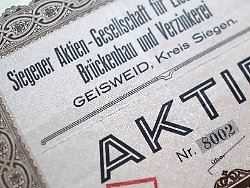Monday, December 13, 2021
In the hands of the founders for generations
These are the oldest family businesses
In times of increasing globalization, they seem to have fallen out of time: companies that have in some cases been run by the same family for centuries. Anchoring in the region and adapting to crises – the pandemic shows what family businesses have ahead of others.
Skilled workers shortage, Corona, bottlenecks in the supply chains? The Heinz family company on the Bavarian-Thuringian border has already survived completely different crises and disasters. The 30 Years War, for example. She has been making glass since 1523, and today the company in Kleintettau is one of the world market leaders in the manufacture of perfume bottles. It ranks 10th on the list of the 50 oldest German family businesses published by the Family Businesses Foundation.
All but the last two companies on the list were founded before the French Revolution in 1789, and all of them have remained in the hands of the founding family without interruption. “For centuries these companies were stability anchors and solid as a rock,” says Stefan Heidbreder, managing director of the foundation. “You are today too.”
As the oldest family business, the foundation lists a metal company in Siegen, the galvanizing specialist The Coatinc Company. The founding date is 1502 – documented because the blacksmith Heylmann Dresseler had to pay a shilling to use a fireplace. The company is now in the 17th generation of family ownership. The company Prym from Stolberg in the Rhineland, known for its snap fasteners, is similarly old.
The companies with centuries of family tradition also include the private banks Berenberg (1590) and Metzler (1674), the pharmaceutical company Merck (1668), which emerged from a pharmacy in Darmstadt, the Bavarian mountain shoe manufacturer Meindl (1683), the Lower Saxony schnapps distiller Hardenberg (1700), the Hamburg vinegar manufacturer Carl Kühne (1722), the Saarland ceramics manufacturer Villeroy & Boch (1748) and the Franconian stationery manufacturer Faber-Castell (1761).
Three reasons for success over the centuries
How does something like that succeed over such a long period of time? Carletta Heinz, who is now in the 15th generation of her family’s glass company, gives three reasons: “Firstly, the courage to always dare to try new things and make decisions, even if they seem unpopular.” Then the feeling for the right employees. “And finally, quite simply, the necessary ounce of luck.”
Entrepreneurship and the courage to change are also led by Frank Stangenberg-Haverkamp, Chairman of the Merck Family Council. “We have a tradition of innovation,” he says. “Scientific curiosity and an entrepreneurial pioneering spirit remain the maxims of our business.” Professor Tom Rüsen from the University of Witten / Herdecke says: “It is often niche players who reach a great age as a family company. They continuously develop their skills.”
Many of these highly specialized companies are located in rural areas, some have become hidden champions, world market leaders in their field. Strict customer orientation and the ability “to understand crises as moments of innovation and to develop the company further” made them astonishingly resilient, says Rüsen. Especially today, when “digitization makes new business models necessary, family businesses have good opportunities”.
“There is a different corporate culture in the country”
Heidbreder points out that family businesses have cut fewer staff during the financial market crisis since 2008 than the DAX corporations. A different corporate culture prevails in the family business in the country, maybe even in the same clubs. Those who lay off employees may then look for staff for a very long time. The absolute will to pass the company on to the next generation leads to a different approach to employees and suppliers, but also to home and the environment, says Rüsen.
The inclusion in the list of the oldest family businesses does not bring the companies more turnover or profit. The Hessian bell founder Rincker “doesn’t sell a single bell for this reason,” says Heidbreder. But most of them proudly present the company’s history on their homepage. Many have set up small company museums. Other companies that weren’t on the list have started investigating. The Swabian candle maker, industrial and dental wax manufacturer Morsa has now been added to the list – it has been owned by the Sallinger family for 14 generations and in 1647.
But of course company stories also come to an end. In third place is the von Poschinger glass factory in Frauenau in the Bavarian Forest, which was founded in 1568 – but which has just “stopped production until further notice”. The effects of the pandemic, bottlenecks in the supply of raw materials and accessories, but also increased energy prices and the CO2 tax made this step necessary, explained Poschinger.
